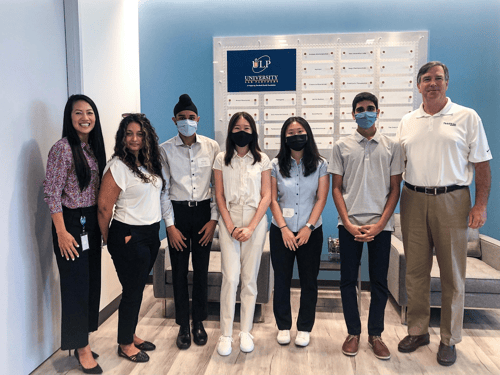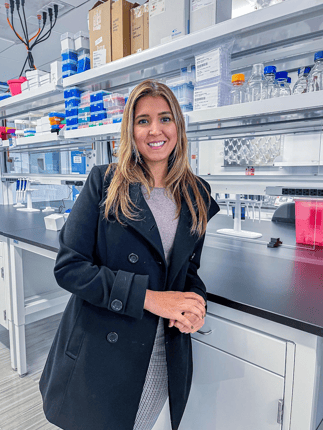Work experience, regardless of the type of job you have, plays a big part in your future after graduation. Having a job or internship, at the core, reveals your commitment to working hard because it shows you can balance an intense school and work schedule. In fact, according to the U.S Bureau of Labor Statistics students who worked 20 hours a week also had higher GPAs. Together, these positions and statistics credit the skills of student workers and their role in leadership, communication, time management, strategic thinking, and professionalism. While these abilities can be learned from other life experiences, putting them into a real-life situation, allows you to gain an essential repertoire for your resume. Many employers are looking to see that you developed a set of relevant professional experiences post-graduation. The best place to gain these experiences is in a work environment. Since a level of professionalism is required, these skills become tangible and transferable in your life, specifically other work experiences.
Keeping in mind that most work experience can teach you a skill or two, there is especially value in work experience that is relevant to your goals. Relevant work experience equips you with the skills and knowledge you will need in your career field. Acquiring these skills before graduation is helpful to the student for two reasons. For one, the student is in an active position where they are building the background experience they will need for their future position. By participating in this job or internship, they are being prepared with the relevant expertise needed to succeed in their future position. Additionally, many employers will be looking to see what you have done during college and how you have applied what you learned. In jobs/internships, you might reach new milestones or accomplishments for the company. These accomplishments show your work performance and highlight how you approach situations. Such steps and stories are put on a resume and ultimately display that when put in a certain situation you have the skills necessary to face the challenge and produce results.
Secondly, having a position before graduation teaches you what skills are expected to be successful in your desired job. When you get into work after graduation, you will know beforehand how to be successful in your line of work. Additionally, by completing these work experiences, you will become familiar with the job description, therefore, revealing if this line of work is what you desire in your future position. If you like this position and are good at the job, you might have an epiphany that this is what you want to do for the rest of your life. At the very least, you will be redirected and it will allow you to decide what you want and what you do not want to do in a prospective job.

🔬Learn: How to Write a Resume
After knowing the value of relevant work experience, what is relevant work experience? Relevant work experience is a position that you are currently in that is closely related to the job that you want to be doing. The best way to know you are completing relevant work experience is to identify what you are doing or what you want to do and if the experience will prepare you for your future short-term and long-term goals. To determine if your position is gearing you for your plans use these five questions as a guide.
Your Job Title
Identifying the job title will help you understand the job description. Since most job titles remain relevantly the same as the job description, you will be able to identify what you are doing and how you can leverage one position to get to the next position. For instance, let’s say you are interested in the engineering industry, start by understanding the different titles and their respective roles. These titles might include: Design Engineer, Research and Development Engineer, Manufacture Engineer, Process Engineer, Project Engineer, and Project Manager, to name a few. Another example might be in business, one could be interested in Chief Executive Officer (CEO), Chief Operating Officer (COO), Chief Financial Officer (CFO), or Chief Technology Officer (CTO).
In contrast, if you are interested in research and academia, you would look for experience in laboratories. Titles you might research include: Research Assistant, Laboratory Technician, Post-Doc, Instructor, Assistant Professor, Associate Professor, or Professor.

Adjectives
Within the job description, employers will use adjectives and adverbs to describe their ideal candidate and these will be the same adjectives they look for in your resume. If you want to know whether or not you are completing work experience tangible to the skills you will need, start at the root. Ensure that the skills you are using are skills you will need. Practical skills will remain consistent across the positions you are interested in. Start by identifying which adjectives and adverbs describes the experience you are in and where you are looking to go.
For example, if you want to be a project manager, the job description might mention having “excellent management” or the ability to “creatively develop.” Based on these descriptions, you want to be active in developing your communication skills and clever in your project timelines and budgeting.
Technical Skills/Knowledge
Be sure to take notice of the technical skills and knowledge as well. In a job description, you might find “technical knowledge” under the qualifications or requirements section. Knowing what qualifications you need beforehand will help you look for beginner positions or projects where you can learn these skills or apply them. Employers are after your demonstration that you can put your knowledge to the test. These requirements, therefore, can be used as a roadmap for learning to become an expert and developing the required expertise needed to be successful in this position.
Going back to the project management position as an example, you might be asked to have experience working with software like Microsoft Project, primavera, or AutoCAD. If you are in your current position, consider how you might learn these programs or how you can implement them into your role. If you need to develop these skills, look for beginner roles where these can be practiced. Overall, the great aspect of paying attention to the technical qualifications needed is that there is a process you must undergo to achieve these skills. In most interviews, you can use this opportunity to highlight your agility to use resources and develop proficiency in the skills required for your job.
Interpersonal and Intrapersonal Skills
Most jobs will also set standards for interpersonal/intrapersonal skills. These are the soft skills the company is looking for in the applicant so they can efficiently work. Most of the time these soft skills will also be stated directly, but they might also inform you indirectly in either the job description or qualifications.
Words and phrases to look out for might include, “Comfortable leading,” “Strong emotional intelligence,” “Supportive,” or “Meaningful,” which are all examples of personable skills. These words establish that hiring managers need someone who can work with team members and build relationships within the company.
Transferable and Applicable
Lastly, recognize that your goal is to use every role to build and grow in your career. Hence, you need to ensure that what you are currently doing is transferable and can be applied to other positions. By this logic, we go back to the saying that “In every job, you should either learn or earn.” This well-known phrase from industry and businesses means you should always be expanding on what you know. The more you learn, makes you inherently more knowledgeable and credible. With this knowledge, you become an asset, which means your value increases, so your earnings increase. Your skills make you marketable and just like supply and demand, the fewer people there are that know a particular skill the higher the demand for your expertise.
From those in the industry, a few hiring managers have kindly shared that they urge employers to “Use job descriptions as a resource.” Treat current roles and potential jobs as a roadmap for planning where you want to be and how to get there. These roadmaps are valuable in providing what you need to know by highlighting the position you are interested in and creating a plan on how to get there. Start by looking for roles you are interested in and correlate beginner roles. Then make a list of the relevant skills that you want to target because you know them or want to learn them. With this list, distinguish which roles that will help you start early on refining your abilities. Apply to these roles with a resume, prep your elevator pitches, and read about how to sell yourself in an interview, so you can start learning and earning.
🔬 Learn: How to Sell Yourself In an Interview
At this point, I encourage you to look around your college campus for opportunities so you can build your career with relevant work experience. College campuses offer multiple opportunities to integrate yourself into a future position. These positions include internships, fellowships, research roles, and more. You might be wondering where you can find these positions, but they are all integrated into a college campus. To know which route to choose, first decipher the type of role you see yourself in the future. There are three main pathways-corporate companies, startups, and academia. Depending on the avenue that interests you, your interest will result in the type of training needed because receiving the right preparation is practical.
Corporate Companies
Working in an established company, often means there are preexisting regulations. These regulations provide larger teams with more structure and definite standards that are expected from employees. An established company will come at face value with their expected qualification and your work will be predictable.
That being said if you like structure and having more management, a big company might be more fitting. You can get your foot in the door with these companies by meeting current workers at panels, industry nights, job fairs, or mentorship programs run by the company. In these events, you can gain access to open internships and co-op positions. Being on a college campus provides multiple opportunities for you to attend these events and find out which positions are available. In the case that you cannot attend these events in-person, there are sites like Handshake and LinkedIn that exist to put your field at your fingertips.
Startup Companies
In comparison, working in startup companies is a very different environment and has been described as “high risk, high reward.” The reality is that startup companies are consistently trying to build their business. They have less structure, less management, and function with minimal team members. For these reasons, startups have been dubbed as “disruptive,” and may not provide stability. Even so, some find it fun to work on groundbreaking technologies to bring a design to life.
If such an experience sounds interesting to you, working for startup companies might be the right place for you. Finding startup company experience can be found through internships or programs that provide startup mentorship. The company will often apply for these programs and can be incubators, accelerators, NSF Innovation programs (I-Corps), and much more. You need to be part of a startup, but you can gain access by looking for companies that are working on projects you are passionate about. Sharing a similar burden, mission, and vision is important for startup teams. Once you enter the startup world it is an entirely different experience and much easier to meet other co-founders and those interested in building their business in society.
🔬 Learn About: Incubator vs. Accelerator

Academia
Aside from professional industry options, you might be interested in academia. Academia is very different from the industry because of the research focus. In academia, you will be asked to work in a discovery environment that usually comes with high stress. Those in academics are good at time management, juggling multiple responsibilities at once, resilience, and evolving. In academia, you need to love what you do and be willing to go through the steps required to receive a professorship title. It is not for everyone, and at any time you can move into the industry. Ultimately, those who do choose to stay in academics do love what they do and find it rewarding.
If this work is what you are looking for consider joining research as soon as possible. Start as an undergraduate and continue to make your way up. There are several ways to get involved with research such as reaching out to campus labs, either the professor or those in the lab, and getting hired as an undergraduate researcher. You might also consider applying for undergraduate research programs, fellowships sponsored by scholar funds, or mentorship research programs. If you are at a research institution, your field of interest and the correlated labs are right in front of you.
All in all, it is best to grow in the respected line of work that you desire to pursue. Relevant work experience is only relevant when you are preparing yourself with the skills and tools needed for the next position.
Download The Ultimate Guide to Wet Lab Incubators in Southern California, a handbook to assist life science start-ups through the entire decision-making process to find wet lab space.
Download Now